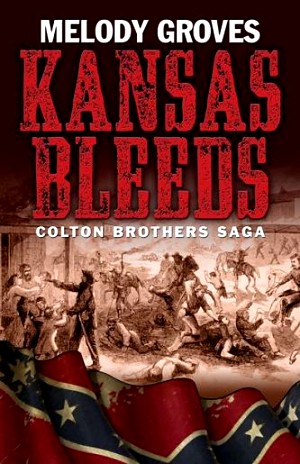Melody Groves Interview

———————————————————-
New Mexico native Melody Groves has a deep love for anything cowboy and Old West. She is also an award-winning author and regularly writes for numerous magazines.
Website: melodygroves.net
Author page on Amazon
———————————————————-
What motivates you to write and how did you get started?
The voices in my head motivate me to write their stories. I know it sounds “weird,” but it’s true. Characters come out of nowhere, perch on my shoulder and whisper their adventures to me. The other things that motivates me for magazines are stories I’d like to share and that darned deadline the editor enforces!
And how did I get started? Who knows? It wasn’t something I truly set out to do, it’s something I’ve always done. I started writing in junior high and never stopped. My mother was an excellent writer, so I think I watched her and was inspired.
Why are you so drawn to write about the West?
The West is where I was born and grew up and it’s in my blood. I’m not one for believing in “supernatural” things, but I do feel tendrils to the old West tugging at me, keeping me grounded here. I have a strong attraction to the area between Las Cruces, NM and Tucson, AZ—almost as if I’ve lived there in another life. It’s that strong.
And the people of the West are a different breed from “Easterners”. They are independent, resourceful and appreciate wide, open spaces.
What is the most common underlying feeling that you think comes through in your novels about the old West and the people who lived there?
Hopefully, the underlying feeling is one of family first and then how tough and resilient the people were. They were looking for redefining themselves and creating a new life, a new identity.
When you’re writing a novel, do your characters take on a life of their own? Are you ever surprised by the characters in your novels?
A life of their own? Absolutely! And surprised by them? All the time. Usually, my characters come to me [I especially appreciate the ones who are already named], and I just try to keep up with their stories—I type as fast as I can. Early on, I tried to direct a couple of my characters and they told me quickly that they would have none of that—they are their own “men”.
When I [they] get stuck in a situation and can’t decide which way to go from there, I ask them “What’s the more interesting way to go?” And so far, they’ve chosen the path that takes them down fascinating and unpredictable endings.
Probably the biggest surprise I had was while writing my second novel, Sonoran Rage, I discovered the two main characters, brothers, had two more brothers back home in Kansas. Well, that certainly changed the dynamics of the stories.
What do you think readers want to experience in books about the West or in books in general?
I think readers want and expect a good story. Whether it’s set in the West or New York, readers need a good story—one with characters they can relate to, one with conflict that is resolved in some way, and most importantly, to be entertained.
Who is an author who inspires you and why?
An author who inspired me is John Jakes, historical fiction. He writes about people who end up in interesting historical events. I’ve learned a ton of American history through him. Another influential writer is Tony Hillerman—he writes landscape fiction. And of course, Elmer Kelton was a terrific writer whose work I love, and he was a nice person, just like Hillerman.
What has writing taught you about yourself?
That’s a really good question. First off, it taught me that I wish I’d started it as a career when I was in college and taken it more seriously then. Second, it’s reinforced my organizational ability—writing several various projects at the same time. It’s also taught me to look at the world more closely and wonder—kind of like a child.
Do you think we should encourage children and young people to write? If so, why?
We should definitely encourage children to write because feelings, thoughts, emotions and observations are easier to deal with when they’re on paper. I feel strongly that the mechanics of writing will come, more importantly, it’s the ideas presented that are crucial to a child’s growth.
What encouraging advice can you offer new writers?
That’s easy—WRITE. Write something every day. It doesn’t have to be good, it doesn’t have to be earth-shattering. But you do have to do it every day. Pretty soon, that’ll be all you can think about. Secondly, join a writer’s group. Surround yourself with writers; they serve as inspiration. Thirdly, trust your gut instinct. Write what you hear and see in your mind. Don’t let anybody tell you “that genre’s not selling,” or “who would be interested in that?” Keep true to yourself. You’ll find your way.